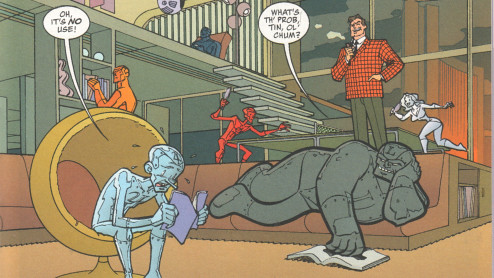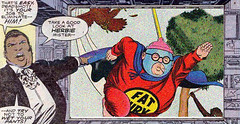First, here's a meme, courtesy the ever-wonderful Ragnell:
Second, some of you may know I teach college English. I'll be teaching a Composition 102 course in Winter Quarter; at this particular institution, each instructor picks his or her own theme for the class. The focus in on rhetoric, i.e., how to write well at the college level; the theme merely provides the subject matter to analyze, talk about, and respond to critically. Recent themes have included Sex, Drugs, and Rock & Roll; Speculative Fiction: Conscious Evolution; and Beyond Big Brother: Surveillance in the 21st Century. For this go-round, I have chosen Comics and Graphic Books: Crossing the Genres.
My idea is to read McLoud's Understanding Comics to give the class some idea of how to talk about sequential art, and then read a graphic novel or equivalent each week. (Another idea would be to start with Kavalier and Clay to position comics culturally, and not worry about doing any formalist analysis of the works themselves.) I need eight or nine titles, and I'd like them to be as diverse as possible. Here's a first stab at what I'm thinking:
Watchmen (post-modern superheroes)
Why I Hate Saturn (contemporary fiction)
Maus (memoir)
Something from Gonick's Cartoon History of the Universe or Action Philosophers (non-fiction)
Sacco's Palestine or Safe Area Gorazde (reportage)
Something from Age of Bronze (classics)
A Contract with God (short stories)
Enemy Ace: War in Heaven (adventure)
Remember, this isn't a class in comics; it's a writing class that will use comics as its readings. This list doesn't have to be historically important or comprehensive; the books merely need to be good. And, of course, I want to cross genres.
So, any comments or suggestions?
Sunday, October 15, 2006
Subscribe to:
Post Comments (Atom)




2 comments:
I'm not sure that Watchmen is the best choice as a sample of post-modern superheroes. How much of its critique is based on differentiating itself from the superhero comics that came before, and would depend on the reader having some familiarity with superhero conventions to see the ways in which they're being disturbed? (I phrase that as a rhetorical question because I don't actually know the answer.) Comics readers think of Watchmen as a big deal because we know the rules Moore and Gibbons broke; non-comics readers sometimes think of it as a big deal because they already "know" superhero comics are nothing but "Zap! Pow! Bam!" and are impressed to see one that contains themes and allusions and relatively sophisticated dialogue. Sometimes I think the non-comics readers are way too impressed by that alone. V For Vendetta is far superior purely as a piece of writing.
Unfortunately, neither of the alternate choices that come to mind is available in collected form: if you could give students Morrison and Quitely's All-Star Superman or Flex Mentallo that would really be something.
If you started with Kavalier and Clay rather than McCloud, and were talking about the historical development of comics in culture (rather than looking at comics "fully formed" as a medium in the modern scene) it seems like you really want to have an older comic to illustrate an earlier stage in that history. Sammy Clay isn't trying to write Maus or Fax from Sarajevo after all -- he can't conceive of those things yet. Maybe something from EC, or a Simon and Kirby collaboration? Something to convey how, even when comics were viewed by mainstream America as kiddie fare, there were writers whose love of the medium and sense of its untapped potential drove them to make stuff that was significantly better.
(And yes, I understand the aim here isn't an overview of comics but a writing course...but some history is still called for; studying a writer's allusions to Shakespeare is impeded if the students don't have any idea who Shakespeare was, or know that educated readers were once presumed to have a good working knowledge of his plays to appreciate those allusions.)
Too much input? I could write a few hundred more words of suggestions...
For a lovely snapshot of traditional "non-post-modern" comicry (that also avoids superheros,) try out Kamandi issue #16. Great stuff by Kirby. And younger students won't rebel at the rehashed Planet of the Apes storyline.
Post a Comment